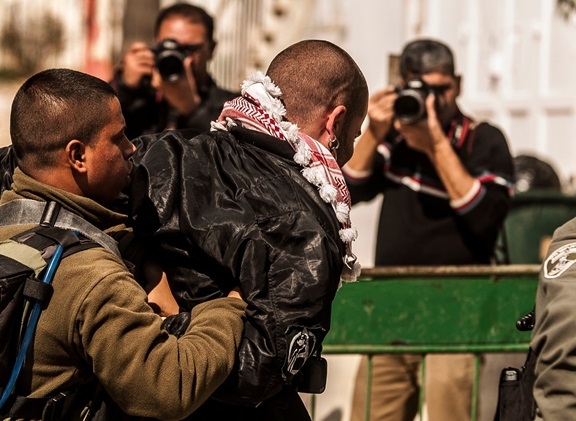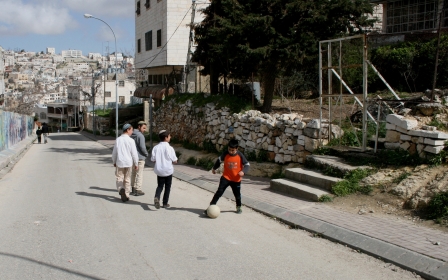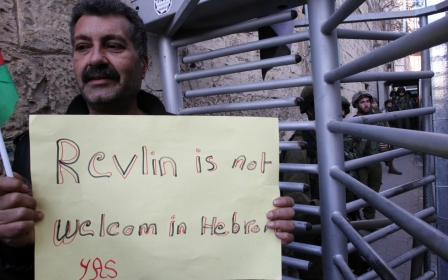Abuses surge as Israeli army unit redeployed in Hebron

BETHLEHEM, West Bank - International observers monitoring human rights abuses against Palestinians in Hebron have reported a marked increase in harassment since February, with frequent night raids, arrests and threats of violence attributed to the redeployment of Israel's Golani Brigade.
Operating in the starkest microcosm of Israel’s segregationist polices in the West Bank – around 600 Jewish settlers live among 30,000 Palestinians in Hebron’s Old City – volunteers monitor abuses at the 18 permanently staffed military checkpoints in the H2 area, accompany Palestinian children to school to prevent settler attacks and document house raids and arrests.
Although accustomed to hostility and threats from Jewish settlers – the UN reports an average of six settler attacks per week in the West Bank - international volunteer groups say Israeli military forces stationed in the Old City are increasingly responsible for abuses against non-violent activists.
“They are affecting our work. We monitor human rights abuses, we film them, we intervene, but they restrict our movement and we can’t reach them. We are not able to reach the victims,” Issa Amro, founder of the Hebron-based Youth Against Settlements group, said.
In late February, the Golani Brigade conducted four raids against an apartment hosting volunteers from the International Solidarity Movement (ISM), the group and local activists said.
In one such incident on 18 February, soldiers reportedly threatened that “bad things” would happen if internationals in the residence didn’t let them into the property. When asked by volunteers for a search warrant, the soldiers responded that they were “the law” and didn’t need one.
A week later, soldiers threatened to throw grenades into the apartment while attempting to arrest a local activist they believed was inside. They also warned ISM volunteers that they wouldn’t “be able to close an eye during night-time”, the group reported.
The next evening, on 26 February, masked soldiers broke into the apartment and gathered all ISM volunteers in one room before confiscating a map from one of the walls and claiming it was sufficient evidence to deport them.
The threat never materialised, but the harassment continued.
“They are targeting us because we are human rights defenders,” Amro said.
“We are afraid, honestly. We had a meeting and we discussed how to continue with this kind of intimidation.”
“Usually it’s from the settlers, now it’s from the soldiers. We wrote letters to the UN Human Rights Council and encourage activists to file complaints and document violations.”
History of violence
Observers in Hebron say the increase in incidents of harassment is directly related to the deployment of the Golani Brigade of the Israeli army in Hebron at the beginning of February.
Groups working on the ground in Hebron are all too familiar with the Golani Brigade’s aggressive tactics, having called for their “immediate withdrawal” from the Old City in 2012 in a document submitted to the UN.
In the report, the groups – including Christian Peacemaker Teams (CPT), ISM, and Youth Against Settlements - recorded an increase in “detentions of adults and children, serious physical injuries sustained while in military custody, home invasions, and an increase in the number and duration of arbitrary detentions of civilians at checkpoints” since their deployment in December 2011.
Local activists say they were withdrawn from Hebron months after their initial deployment, and an Israeli army spokesman told Haaretz newspaper in February 2012 that following the complaints “some specific instances of deviation from army orders were identified” and were addressed at a “disciplinary level”.
Since their return earlier this year, activists are increasingly worried for their personal safety and the ability to carry out their work without restrictions.
“They are very violent, especially towards activists. It’s almost daily, it’s frequent. It has become a phenomenon of the Golani Brigade,” Amro said.
Another local peace activist, who preferred not to be identified, said that he has been harassed daily, asked for ID, and detained on accusations of attacking a border police officer over the past month.
He said that members of the Golani Brigade check the IDs of activists at least two to three times a day and often prevent them from crossing checkpoints in H2, a vital part of their accompaniment and monitoring work.
“At checkpoints, some of them (Golani Brigade) will fire sound bombs or tear gas a lot, even if no stones are being thrown. Or after children have left, they will fire tear gas at schools.”
Activists routinely receive verbal death threats from soldiers manning checkpoints, and on 1 March, two volunteers from CPT were detained in a settlement police station for five hours while accompanying children from a kindergarten.
On 15 March, an ISM activist was also detained by Israeli forces in an arrest captured on camera for allegedly “attacking” a border police officer, although video footage of the incident proved otherwise.
He was detained for seven hours and banned from Hebron for two weeks.
International activists say they have also been the subject of training exercises for the Golani Brigade, usually at night, and have been violently searched and detained on several occasions.
“We felt our lives were in danger (during the arrest), we are afraid of them and we felt they could shoot any one of us at anytime. We have received death threats, and personally they told me they are ‘waiting for an opportunity to shoot me’,” Amro said.
Despite the increased harassment, Amro said all local groups will continue serving Palestinians trapped between checkpoints, settlers and Israeli military forces.
Given the complete lack of accountability for settler attacks and Israeli army abuses, the work of volunteer monitors is as important as ever in documenting the systematic violence of Hebron’s divided H2 area.
“It’s very obvious that they are targeting human rights workers because they don’t want us to document rights violations and what is happening in Hebron.”
New MEE newsletter: Jerusalem Dispatch
Sign up to get the latest insights and analysis on Israel-Palestine, alongside Turkey Unpacked and other MEE newsletters
Middle East Eye delivers independent and unrivalled coverage and analysis of the Middle East, North Africa and beyond. To learn more about republishing this content and the associated fees, please fill out this form. More about MEE can be found here.




